Not all readers are leaders, but all leaders are readers — Harry S. Truman
I do not mean to start a philosophical debate over whether or not Truman’s statement holds true in today’s day and age where reading may not necessarily square with the image of someone holding a book open.
But because entrepreneurship embodies some traits of leadership, I wonder whether reading is as important to entrepreneurs as it is to leaders? In other words what value would entrepreneurs get from reading?
If you are like me, the visual that comes to mind about entrepreneurs is that of busy folks. Typically these have less to no time for other things like reading, watching movies or so we think. Yet by engaging in such activities world-class entrepreneurs you and I know find solutions to critical business issues challenging them.
The lines ahead tell how and provide actionable advice that can be put into practice right away.
If you have read my book review of How to win at the sport of business, you would recall that the owner of the Dallas Mavericks Mark Cuban was, perhaps still is, a voracious reader in the early days of his entrepreneurial life.
I would continually search for new ideas. I read every book and magazine I could. One good idea would lead to a customer or a solution - Mark Cuban
Sometimes the answer to a business problem may come from an unexpected place such as a movie made for purposes far remote from teaching a business lesson.
In The hard things about hard things Ben Horowitz tells examples of movie scenes that helped him overcome business challenges. Next is one of them.
Ben is co-founder of the VC firm Andreessen Horowitz and previously cofounder and CEO of Opsware, acquired in 2007 by HP for $1.6 billion.
Many years ago, I encountered a particularly tricky management situation. Two excellent teams in the company, Customer Support and Sales Engineering, went to war with each other. (…). These groups had to work together constantly in order for the company to function. Both teams boasted superb personnel and outstanding managers, so there was nobody to fire or demote. I could not figure out what to do. Around this time, I miraculously happened to watch Freaky Friday starring Barbara Harris and Jodie Foster. In the film, mother and daughter grow completely frustrated with each other’s lack of understanding and wish that they could switch places and, through the magic of film, they do. By being inside each other’s bodies, both characters develop an understanding of the challenges that the other faces. As a result, the two become great friends when they switch back.
After watching both the original and the remake, I knew that I had found the answer. The very next day I informed the head of Sales Engineering and the head of Customer Support that they would be switching jobs. After just one week walking in the other’s moccasins, both executives quickly diagnosed the core issues causing the conflict. They then swiftly acted to implement a simple set of processes that cleared up the combat and got the teams working harmoniously. From that day to the day we sold the company, the Sales Engineering and Customer Support organizations worked better together than any other major groups in the company — all thanks to Freaky Friday, perhaps the most insightful management training film ever made — Ben Horowitz
Other times the solution to a business problem may well be resting inside a book — not necessary one labelled business book!
In Startup CEO, Matt Blumberg, Founder and CEO of Return Path Inc. wrote:
There is probably a shelf of books for every specific challenge you’re facing and it’s worth making your way through them when you’re trying to get a handle on the specific challenges your company is facing. This is also the time to revisit the big classics: the books that you instinctively reach for every time you’re stuck (…). Market research, stakeholder interviews, and a careful review of the literature on your immediate challenges will help you make many of the small decisions (…). The big classics will remind you to take a step back and situate your plan in a much larger context - Matt Blumberg
The most successful CEOs reportedly read an average of 60 books per year.
In Entrepreneurial Leap (book review), Gino Wickman recommends to read one non-fiction book a month, biographies of successful entrepreneurs (live and dead I’d add) in addition to podcasts and business blogs.
The challenge in my view is figuring out which books to read, what content to consume, how to draw a parallel with one’s own challenges and taking action. Worth noting: sometimes a content may only tell “things no to do” and that’s ok. Such things are by no means less valuable than the “things to do”.
So in the end shall we rewrite Truman’s statement as Not all readers are entrepreneurs [I’d agree], but all entrepreneurs are readers [I’d disagree]?
I’d agree in full with Not all readers are entrepreneurs, but entrepreneurs would benefit a lot from reading.
Got any thoughts? Let me know.
